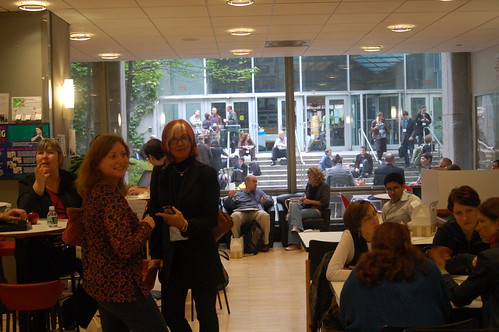 |
|
|
|
 |
|
|
I am at the Games for Change conference (festival) in New York. I’m not sure if I’m uptown or downtown. It’s on 12th street, just east of 5th avenue, at The New School of Design. It’s a small/compact conference with lots of people who care. Games for Learning is about designing and using video games as a force for social change. It’s an area that I know little about, except conceptually, since I don’t really play video games. I’m here to learn, and the opening keynote certainly offered lots of opportunities for that.
Nicholas Kristof, a columnist for The New York Times, has writing extensively about social change, apparently focusing most recently on Darfur. He made some interesting points about communication, that Toothpaste companies do a better job of selling ideas than most humanitarians. He said that large numbers simply do not do the job, that the human brain isn’t wired to handle large numbers. As we evolved, we were seldom surrounded by anything exceeding a dozen in quantity. “Six people starving is a tragedy. A million people starving is a statistic.”
He told about a middle school in the Bronx, where the plight of Darfur had become an integral part of the culture of the school — because of the video game, Darfur is Dying. Incidentally, two of the developers of the game were in the audience. He said that they school sent him an invitation to come and speak by sending him to a web page URL: dearmrkristof.com.
He said that the struggle that defined the 19th century was irradicating slavery. Of the 20th century, it was defeating totalitarianism. He suggests that gender inequity in the developing world will define the 21st century.
The next session was about Pew’s recent report on teenagers, video games, and civic involvement. Joseph Kahne listed five myths about video games:
- Video games are violent. There are violent video games, but teenagers, in truth, are playing all kinds of video games.
- Many boys play only violent games. In truth, most youth play many genres of games, especially boys.
- Game Play isolates you. 65% reported that they play in the presence of others and 27% reported that they play online, collaboratively with others.
- The Game defines the experience. Not true. Many games offer huge opportunities for differentiation of the game experience. My son got bored with Halo in a couple of weeks. So he and his friends started inventing their own games to play in the Halo environment.
- There is a huge digital divide when it comes to different groups’ video game play. Again, nearly 100% of teens play video games across all demongraphics.
What I found interesting was the notion that the digital divide is more about the divide between classrooms that are making authentic, productive, empowering use of digital technologies, and classrooms that are using it to drill and kill (my wording).
The second speaker of that session was Ian Rowe, who works for the Bill & Melinda Gates foundation. He is currently focused on college completion. He reported that only 70% of U.S. teens finish high school. But only 50% of entering college students graduate with a degree. Part of the problem is that only half of the graduating high school students are prepared for college (1/3 of all high school students).
It’s time to bring this entry to a close, except to share one thing that Jim Gee said in a later session on assessment and video games. He said, “Looking at the choices that people make in solving problems is a good predictor of knowledge they have gained. But measuring knowledge does not predict problem solving ability.”
Choice vs Knowledge

This has certainly been my experience this year. I had a very hard time with one of my seventh grade classes, at least in part because I had a very hard time finding projects for them to do… but it was VERY easy to find reading comprehension quizzes and tests for them to do.
I feel like I didn’t really help them much at all, because I didn’t teach them how to analyze data or build an understanding of history based on a need to find solutions in the past to problems in the present.
Hi David,
Part of Dot-to-Dot will be a panel on the future of education, particularly in terms of collaborative projects from all around the world. It would be great to have you on this panel if you’re available. We know that you’ve been an advocate of positive change for a long time. Please let us know if you’re interested, or if we can link you in to the website if you wanted to live stream from another location.
Pat (on behalf of CIS 339)